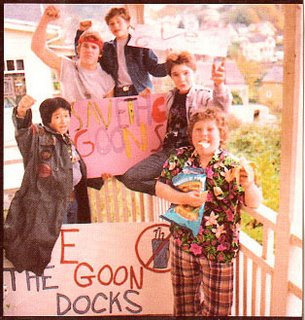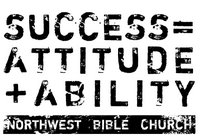 The story of a pack of kids who catches wind of some criminals up to mischief in their hometown then bands together to nab the bad-guys and save their neighborhood from impending danger never gets old does it? Maybe it is because we long for the innocence of childhood while at the same time wanting our lives to count for something.
The story of a pack of kids who catches wind of some criminals up to mischief in their hometown then bands together to nab the bad-guys and save their neighborhood from impending danger never gets old does it? Maybe it is because we long for the innocence of childhood while at the same time wanting our lives to count for something.
This Saturday, 727 will dance with our childhood fantasies as we view the 80's cult-classic "The Goonies." For info on this event, click here. And if you have 12 minutes to waste, check out The Goonies Vacation. A couple of 20-something fans traveled up to the shoot location to relive their favorite childhod movie and in the process they added fuel to the Goonies fire. The "National Lampoons Vacation" clips are a riot.
7.31.2006
Goonies Coming to Northwest
Posted by
clayburkle
at
12:48 PM
0
comments
![]()
Cinderella Man
 A few weeks ago my wife and I spent a Sunday Night watching the critically acclaimed Ron Howard film, Cinderella Man. We had heard good reviews from our friends about this story of an against-all-odds boxer trying to survive during the depression. But we weren’t quite prepared for how the story would resonate with us. We quickly became enamored with the hero, James J. Braddock who quickly fell from being a touted prize-fighter to a husband and father of three just struggling to pay the heating bill.
A few weeks ago my wife and I spent a Sunday Night watching the critically acclaimed Ron Howard film, Cinderella Man. We had heard good reviews from our friends about this story of an against-all-odds boxer trying to survive during the depression. But we weren’t quite prepared for how the story would resonate with us. We quickly became enamored with the hero, James J. Braddock who quickly fell from being a touted prize-fighter to a husband and father of three just struggling to pay the heating bill.
The story of James J. Braddock’s struggle to keep his family together during the toughest of times and his mythic rise as a figure of hope for the average man of the depression impacted me. I saw what appear to be biblical themes being lived out, incarnated before my eyes and in my heart I longed to measure up. And as the movie wound down I found myself on my feet cheering on this Rocky-like underdog as he represented me, the average man fighting the good fight. Here is what I remember of the hero:
He had Integrity: At one point in the story, Braddock’s oldest son stole a salami. The boy confessed that he was afraid that if his parents couldn’t feed him that the kids might be sent away. Braddock marched his son back to the grocer to return the stolen goods. He knew that ones desperate need did not justify taking advantage of others. His own character and reputation was more valuable than a full stomach.
Whoever walks in integrity walks securely, but he who makes his ways crooked will be found out. Proverbs 10:9
He was a Good Father: In the same seen above we find out that the son stole the salami out of fear that the family would be broken up. Braddock sensing the fear in his son looked him in the eye and promised to keep the family together. As he struggled to follow through on his promise he humbled himself to accept support from the government. He even swallowed his pride enough to go to the boxing promoters whom he had made rich and to beg for some handouts from them. He took his responsibility as a provider and protector of his family as seriously as a prize-fight.
As a father shows compassion to his children, so the LORD shows compassion to those who fear him. Psalm 103:13
He gave Hope to the Hopeless: Braddock’s rise from the streets to world champion status made him a mythic hero for every struggling, working man. Men struggling to find work identified with Braddock as one who walked in their shoes and faced their pressures. So with every blow that Braddock landed it was as if America’s depressed were being lifted from their devastation and freed, if but for a moment, from their own chains of poverty. It is here that Braddock becomes almost Christ-like, as a man who saves men from their hopelessness.
Therefore he had to be made like his brothers in every respect, so that he might become a merciful and faithful high priest in the service of God, to make propitiation for the sins of the people. Hebrews 2:17
Jesus, the incarnation of God, has walked in my shoes. He walked with integrity, caring for his people like a father, giving hope to the hopeless. His life was whole and unified in its loyalty to the will of the Father. The story of James J. Braddock as “The Cinderella Man” has re-connected my heart with the one who has fully identified with me and offers not just a mythic hero to follow but propitiation for my sin.
Posted by
clayburkle
at
11:10 AM
1 comments
![]()
Part 6, Talking Directly
Sorry for the delay in this final post. Here's are my other thoughts on Christian Conflict:
Part 1, How should Christians Fight?
Part 2, The two R's of Christian Conflict
Part 3, Seeing Clearly
Part 4, Approaching Humbly
Part 5, Speaking Cautiously
One of the simplest guidelines in this matter of resolving our disagreements often becomes the most difficult and therefore the most neglected. Sitting down and talking directly face-to-face with the person involved. For some reason this is a fearful thing for us to consider. It takes real courage to look someone in the face and say “you hurt me” or “you offended me” or “I think what you did or said was wrong.”
It is much easier for us type out an e-mail, hit the send button and then hide behind our computers. I have received e-mails from people that should have never been sent. Sometimes the e-mails don’t even go to me, but to others about me. What’s up with that?
If your brother sins against you, go and tell him his fault, between you and him alone. If he listens to you, you have gained your brother. (Matthew 18:15)
If you truly want to gain your brother do him the honor of approaching him face-to-face. When you do this you have the chance to dialogue with him, to discuss the situation. To hear him out and be heard. Truth resides in dialogue. If you fire off an e-mail or leave a voicemail there is no opportunity for brother-gaining discussion.
Paul even did this when he had an issue with Peter’s apparent hypocrisy in Antioch. Paul did fire off another letter to Peter, he opposed him to his face (Gal 2:9). At issue was the affect that Peter’s choices might be having on the Gentile believers. Paul was afraid that some believers might be led astray, so he told him to his face, and it appears that he gained his brother. So if you are tempted to fire off that nasty-gram, like I am every so often. Hit the delete button and take them out for a cup of coffee. You might pick up the tab, but you also might gain your brother.
The goal of our conflict should be restoration and reconciliation. And this is only possible to restore broken relationships through face to face interaction. Then you can see the body language, the facial expression, hear the tone in the voice and ask questions. Understanding one another requires lots of questioning and probing all of which is impossible through letters or e-mails. Often times that type of communication only inserts other hurts and misunderstanding into the situation. Direct communication while sometimes difficult is the sole path by which restoration is possible. No other road leads to a restored relationship other than direct conversation.
Posted by
clayburkle
at
12:25 AM
0
comments
![]()
7.17.2006
Kickin' It for Jesus
 Truly, I say to you, unless you turn and become like children, you will never enter the kingdom of heaven.
Truly, I say to you, unless you turn and become like children, you will never enter the kingdom of heaven.
Jesus
This time of the year soccer is on my mind. One big reason is that I am extremely involved in the Northwest Soccer Camp, a camp that we run for our community. In one week we will have dozens of 8-13 boys and girls stomping around on the grass working on headers, square passes and penalty kicks. But we hope that this is not just another soccer camp. So we add a twist.
We emphasize character training. Why? Good soccer players don't necessarily make good citizens or good employees or good husbands & wives. But if we can use soccer as a vehicle to challenge kids to be good people, then we are on to something. 
So this year we are appealing to the innate desire within kids to be a success, at least at something, even if it is not soccer. So we will be challenging them with "The 3 Keys to a Successful Attitude." Each day we will drive home one key idea. And then we will reinforce it at the end of the day by have a professional player from the Columbus Crew share how they have learned that lesson as well.
Kids certainly have much to learn, and their path from naivete to wisdom requires much direction. We hope that this camp will be one of those experiences which helps shape them for their future. But according to Jesus, we adults have something to learn from these children. Maybe its their simplicity, or their trust, or honest questioning. So during this camp an interesting event will take place. We will be mentoring, coaching and directing the kids... and simultaneously we will be learning a lesson from them on "how to enter the kingdom of heaven."
Posted by
clayburkle
at
9:22 AM
0
comments
![]()
7.16.2006
Costly Mistakes
 Have you ever made a costly mistake? I just made one yesterday and I'm still trying to figure out how to get over it. I lost my iPOD Video....that is the short of it. You see I went on a long run and my lovely wife was going to pick me up at my final destination...quite nice of her. And when she picked me up I made a fatal mistake, I took off the iPOD and put it on the roof of the car. A simple act, but that was the mistake. After I did that I got a drink of water, cooled down a bit and then loaded into the cars (sans iPOD). It wasn't until last night that I realized my blunder. I had never retrieved my traveling jutebox from the rooftop. So last night at 10:30 pm I grabbed a flashlight and headed out to the scene of the crime. I found nothing...and now someone is probably joyfully loading their favorite videos onto my iPOD.
Have you ever made a costly mistake? I just made one yesterday and I'm still trying to figure out how to get over it. I lost my iPOD Video....that is the short of it. You see I went on a long run and my lovely wife was going to pick me up at my final destination...quite nice of her. And when she picked me up I made a fatal mistake, I took off the iPOD and put it on the roof of the car. A simple act, but that was the mistake. After I did that I got a drink of water, cooled down a bit and then loaded into the cars (sans iPOD). It wasn't until last night that I realized my blunder. I had never retrieved my traveling jutebox from the rooftop. So last night at 10:30 pm I grabbed a flashlight and headed out to the scene of the crime. I found nothing...and now someone is probably joyfully loading their favorite videos onto my iPOD.
How we respond in these situations is quite revealing. I'm a blamer. I figured out some way to blame my wife for not reminding me to grab the gadget. I even wondered, God why have you allowed this injustice to happen to me. But as passing time cools my thoughts I realize that no one is to blame but me. I make decisions, I make choices and I make mistakes...and I have to live with the results. It's quite simple. I'd love to get my video iPOD back, but if I not...it's void will be a silent reminder of my costly mistake.
Posted by
clayburkle
at
10:14 AM
1 comments
![]()
7.13.2006
What's Your Style???
 I'm not talking hair or clothes or even music... I'm talking church. I spent some time today researchng a Pastor's Conference that I am interested in and they posted some interviews of the speakers. One that really caught my eye was Mark Driscoll of Mars Hill Church in Seattle, WA. He talked about style in ministry. The Bible is pretty clear that Christ has "sent" the church to its local geography as "missionaries" through whom he wants to announce the good news of his kingdom. But how we do it, or in what style is an issue that often trips us up. What things MUST NOT change in translating the gospel to our neighbors and what things do we have the freedom to change. I like Mark's answer. See it for yourself.
I'm not talking hair or clothes or even music... I'm talking church. I spent some time today researchng a Pastor's Conference that I am interested in and they posted some interviews of the speakers. One that really caught my eye was Mark Driscoll of Mars Hill Church in Seattle, WA. He talked about style in ministry. The Bible is pretty clear that Christ has "sent" the church to its local geography as "missionaries" through whom he wants to announce the good news of his kingdom. But how we do it, or in what style is an issue that often trips us up. What things MUST NOT change in translating the gospel to our neighbors and what things do we have the freedom to change. I like Mark's answer. See it for yourself.
http://desiringgod.org/media/video/2006_National/national2006_driscoll_interview4.mov
Posted by
clayburkle
at
11:39 AM
0
comments
![]()
7.10.2006
Part 5, Speaking Cautiously

Sticks and stones may break my bones
But words will never hurt me.
Lies, lies, lies. Words don’t hurt our bodies, but they penetrate deep into our souls and they either give life or suck the life out of us. Words can be like a refreshing summer rain quenching the thirst of a dry flower bed. Or they can be like a swarm of small termites which slowly eat away at a giant oak tree until it is so hollow inside that it comes crashing to the ground.
When you are offended by something someone does or says, watch your tongue. Your natural tendency will be to say something to someone. The tongue is small, but it is powerful. Remember James caution?
How great a forest is set ablaze by such a small fire! (James 3:5)
Word once spoken can be like hand-grenades tossed into a battle zone. The can cause destruction that is irrevocable. You can’t take them back. You can try, you might even be forgiven, but the damage has been done. James compares the tongue to untamable wild beast, and says it is full of deadly poison (James 3:1-13).
In your offended state you are liable to think some nasty things about the person… they may even be true and the person may even deserve it. But don’t pollute your mouth (or your e-mail) by hitting the send button. Whenever I am tempted to spout out some poison I sit down and write out a nasty e-mail or letter…I let it all out. Then I sit back, take a deep breath and hit delete button. Then I physically get up, walk away from the situation (if I can) and prayerfully consider a wiser approach.
The bottom line is watch your words. Too many, too quick, too close to the situation will often get you in trouble. The Proverbs offer some great nuggets about speaking cautiously, check out these nuggets of truth (NLT):
Too much talk leads to sin. Be sensible and keep your mouth shut. (10:19)
The words of the wicked are like a murderous ambush, but the words of the godly save lives. (12:6)
Some people make cutting remarks, but the words of the wise bring healing. Truthful words stand the test of time, but lies are soon exposed. (12:18-19)
A gentle answer deflects anger, but harsh words make tempers flare. The tongue of the wise makes knowledge appealing, but the mouth of a fool belches out foolishness. (15:1-2)
Everyone enjoys a fitting reply; it is wonderful to say the right thing at the right time! (15:23)
Kind words are like honey-- sweet to the soul and healthy for the body. (16:24)
A truly wise person uses few words; a person with understanding is even-tempered. Even fools are thought wise when they keep silent; with their mouths shut, they seem intelligent. (17:27-28)
Wise words are like deep waters; wisdom flows from the wise like a bubbling brook. (18:4)
Posted by
clayburkle
at
2:56 PM
0
comments
![]()
Just a suggestion....

If you've ever received a "helpful" suggestion from a well-meaning do-gooder then you'll get a chuckle out of this voicemail that one pastor received.
http://ship-of-fools.com/Signs/blunders/hello_pastor.html
Posted by
clayburkle
at
2:36 PM
0
comments
![]()
7.06.2006
Part 4, Approaching Humbly
 If you are considering approaching someone because you disagree with something they have done or said, approach humbly. What I mean is check your motive. Check your heart. For the motives that reside deep in your heart must first be addressed by you before you are ready to approach them. In James 3 (13-17) we see a negative to avoid and a positive to strive for.
If you are considering approaching someone because you disagree with something they have done or said, approach humbly. What I mean is check your motive. Check your heart. For the motives that reside deep in your heart must first be addressed by you before you are ready to approach them. In James 3 (13-17) we see a negative to avoid and a positive to strive for.
If you have bitter jealousy and selfish ambition in your hearts, do not boast and be false to the truth. (James 3:14)
Are you struggling with bitterness toward this person? That might mean you have let past small issues well up inside you and you have walled them off in your heart. Are you feeling jealousy towards that person? If you can’t go up and sincerely praise them or encourage them, then you might have a jealousy problem. Is there something you are trying to personally gain from by confronting this person? If you hope to win something while they lose something in this process, you might have a selfish ambition. Confess these feelings and repent of them before proceeding.
Wisdom from above is first pure, then peaceable, gentle, open to reason, full of mercy and good fruits, impartial and sincere. (James 3:17)
Here is the litmus test for a humble approach. Such an approach is wise and pleasing in God’s eyes. It is open to reason which is seeking first to understand the person before bashing them over the head with your correction. It is possible that you misunderstand them and by engaging in a conversation you are open to be persuaded by the facts and better understand their position. A humble approach is full of mercy, holding back what you think they deserve, it seeks peace which heals the relationship and is gentle not abusive.
If you must approach someone, thinking that you see the situation clearly, do it with wisdom from above. Pray for a right heart and confess any bitterness, jealousy or selfish ambition. Ask God to fill you with mercy and gentleness and first seek to understand by asking questions and listening then engaging them in discussion.
Here are a few questions to consider starting such a conversation:
Why did you do/say xxxxxx ?
What did you intend when you did/said xxxxxx ?
Were you aware that your action/words could have xxxxxx effect?
Posted by
clayburkle
at
12:29 PM
0
comments
![]()
7.05.2006
Part 3, Seeing Clearly
Now let’s walk down the path of how to resolve our conflicts.  Appropriately.
Appropriately.
Biblically.
Wisely.
Maturely.
Effectively.
It is easy to make judgments of others, because we are naturally caught up in the lives of others. Jack Johnson captured the idea in his song "Wasting Time" with these words...
“everybody thinks that
everybody knows about
everybody else,
nobody knows anything
about themselves
cause their all worried
about everybody else.”
It is easy to make judgments of others. It is even necessary. I would say that life is largely about making judgments. My job as a dad is to teach that to my kids. I want them to judge the advice they receive and who gives it. I want them to make right judgments about choosing friends and jobs and hobbies. Life is about decision making based on our judgment of people and situations. Life even calls for us to share our judgments with others and even with the people about whom we are making the judgments. But the Bible warns us that would should tread lightly when we walk down this path.
The reason is that while we think we might see others clearly, we are often far-sighted. We seem to think we see things in others lives (speech, actions, decisions) very clearly while we are blind to our own issues. For this reason we should first look in the mirror, judge ourselves first, then and only then will we see with the clarity necessary to speak clearly with wise judgment about others. Jesus taught this very lesson in Matthew 7:3-5….
Why do you see the speck that is in your brother's eye, but do not notice the log that is in your own eye? Or how can you say to your brother, 'Let me take the speck out of your eye,' when there is the log in your own eye? You hypocrite, first take the log out of your own eye, and then you will see clearly to take the speck out of your brother's eye.
We must first be willing to submit ourselves to the standard which we are going to hold someone else up to. Remember we are far-sighted and often blind to our own shortcomings, so we need others in our lives that will honestly bring clarity to our issues.
Here are some suggestions for seeing clearly:
-Make friends who will honestly & lovingly point out your weaknesses and listen to them.
-Before speaking judgment about someone else’s issue, have your friend judge you in that area.
-Consider that the speck you see in someone else might be a log in your own life.
Posted by
clayburkle
at
2:30 PM
0
comments
![]()
7.02.2006
Part 2, The 2 R's of Christiann Conflict
 When we must deal with those who have offended us there is a both a practical and theological goal for our confrontation. We must seek Restoration and Reconciliation.
When we must deal with those who have offended us there is a both a practical and theological goal for our confrontation. We must seek Restoration and Reconciliation.
Restoration
Brothers, if anyone is caught in any transgression, you who are spiritual should restore him in a spirit of gentleness. Keep watch on yourself, lest you too be tempted. (Galatians 6:1)
The first five verses of Galatians six discuss the responsibility that we have to one another as followers of Christ. The key responsibility we have is to work to restore the person. We should help to pick them up, dust them off and put them back on their spiritual feet.
When the sin is a personal offence against us in word or deed this can become personal struggle with our own tendency to sin. If we have been hurt, we might want to hurt them. If we feel estranged, we might want to let them feel the ostracism that we have. But that is not restoration. We have an opportunity to offer forgiveness and do so in such a way that they are welcomed back into the community of faith.
Reconciliation
All this is from God, who through Christ reconciled us to himself and gave us the ministry of reconciliation; (2 Corinthians 5:18)
Reconciliation is the commitment to restore a relationship to harmony. God has done this for us, something that we could not do for ourselves. We offended him, but he came to us in reconciliation. We betrayed him and walked out on him, but he humbled himself to restore our relationship to harmony. We have been forgiven a great offense, and therefore should be quite thankful. Then he released us to do the same with others.
As those who have been forgiven we have the motivation and power to live out lives of reconciliation. We share how people can be reconciled to God, but we also seek to restore broken relationships in our own lives. It is part of our being, to be reconcilers. When we are offended or hurt, we remember how we have been forgiven our own offences by God and we seek to repair and heal the relationship.
It’s not that we are so shined up and clean that we never offend or disagree or hurt one another. But when that happens we struggle through our own insecurities to restore relationships and reconcile with our offender.
Posted by
clayburkle
at
7:29 AM
0
comments
![]()






